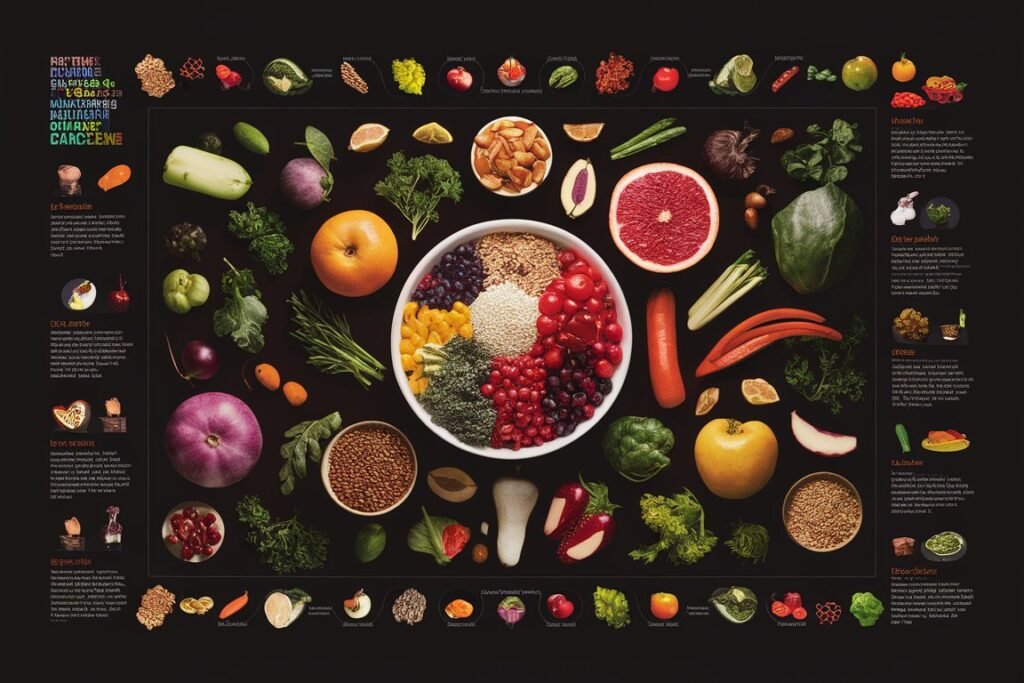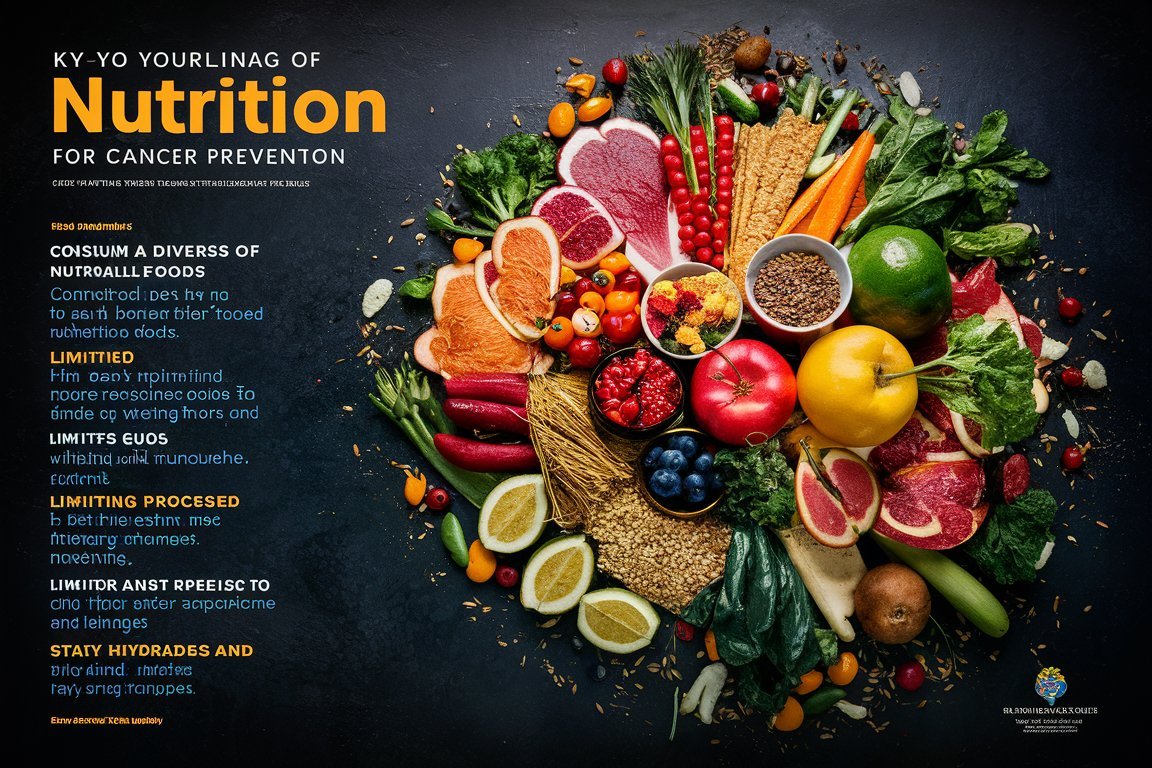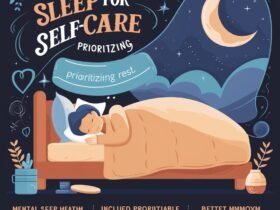Nutrition for Cancer Prevention: Eating for Optimal Health
Hey there, my young and vibrant friends of 2024! It’s your favorite nutrition superhero, Nita Sharda, here to take you on an exciting journey into the world of cancer prevention. Now, I know what you might be thinking – “Cancer prevention? That sounds like something only grown-ups need to worry about!” But trust me, it’s never too early to start taking care of your health and making smart choices about the foods you eat.
Today, we’re going to put on our superhero capes and discover how the power of nutrition can help us fight off cancer and keep our bodies strong and healthy. But before we dive in, let me make one thing clear – this is not about putting anyone on a strict diet or making them feel bad about what they eat. It’s simply about empowering you with the knowledge and tools to make food choices that support your health and well-being, now and in the future.
So, are you ready to join me on this cancer-fighting adventure? Let’s go!
What is Cancer?
First things first, let’s talk about what cancer actually is. Cancer is a disease that happens when some of the cells in your body start growing out of control. These cells can form lumps or tumors and can spread to other parts of your body if they’re not caught early.
There are many different types of cancer, and they can affect different parts of your body, like your skin, your bones, or your organs. Some common types of cancer include:
- Breast cancer
- Colon cancer
- Lung cancer
- Prostate cancer
- Skin cancer
While cancer can be scary, the good news is that there are many things we can do to lower our risk of getting it. And one of the most important things we can do is to eat a healthy, balanced diet.
The Link Between Nutrition and Cancer
So, how does nutrition fit into the cancer prevention picture? Well, believe it or not, the foods you eat can have a big impact on your risk of getting cancer. In fact, some experts believe that up to 30-40% of all cancers are related to diet and nutrition.
Here’s how it works: the foods you eat can either help protect your cells from damage or contribute to cell damage and inflammation, which can increase your risk of cancer over time.
For example, foods that are high in antioxidants, like fruits and vegetables, can help protect your cells from damage caused by harmful molecules called free radicals. On the other hand, foods that are high in unhealthy fats and processed sugars can contribute to inflammation and cell damage, which can increase your risk of cancer.
Key Nutrients for Cancer Prevention
So, what are the key nutrients that can help lower your risk of cancer? Here are a few of the most important ones:
1. Fiber
Fiber is like a superhero for your digestive system. It helps keep things moving smoothly and regularly, which can help lower your risk of colon cancer.
You can find fiber in all kinds of delicious foods, like:
- Fruits and vegetables
- Whole grains like oats, quinoa, and brown rice
- Legumes like lentils, chickpeas, and black beans
- Nuts and seeds
Aim to get at least 25-35 grams of fiber per day.
2. Antioxidants
Antioxidants are like the bodyguards of your cells. They help protect your cells from damage caused by harmful molecules called free radicals, which can contribute to cancer development.
You can find antioxidants in all kinds of colorful fruits and vegetables, like:
- Berries (strawberries, blueberries, raspberries)
- Leafy greens (spinach, kale, collard greens)
- Citrus fruits (oranges, grapefruits, lemons)
- Tomatoes
- Sweet potatoes
- Nuts and seeds
Aim to eat a rainbow of colorful fruits and vegetables every day to get a wide variety of antioxidants.
3. Vitamin D
Vitamin D is like a secret weapon for cancer prevention. It helps regulate cell growth and may help prevent the development of certain types of cancer, like colon, breast, and prostate cancer.
Your body can make vitamin D when your skin is exposed to sunlight, but it can be tough to get enough vitamin D from the sun alone, especially if you live in a place with long, dark winters. That’s where food comes in! You can find vitamin D in:
- Fatty fish (salmon, tuna, mackerel)
- Egg yolks
- Fortified dairy products (milk, yogurt, cheese)
- Fortified cereals and juices
Aim to get 600-800 IU of vitamin D per day.
4. Omega-3 Fatty Acids
Omega-3 fatty acids are like the peacemakers of your body. They help reduce inflammation, which can contribute to cancer development, and may help slow the growth of cancer cells.
You can find omega-3 fatty acids in:
- Fatty fish (salmon, sardines, anchovies)
- Flaxseeds and chia seeds
- Walnuts
- Fortified eggs
Aim to eat fatty fish at least twice per week, or consider taking an omega-3 supplement if you don’t eat fish.
Putting It All Together: A Cancer-Fighting Meal Plan
Now that we know some of the key nutrients for cancer prevention, let’s talk about how to put them all together into a delicious and nutritious meal plan. Here’s an example of what a day of eating for optimal health might look like:
Breakfast:
- Whole grain toast with mashed avocado and sliced tomatoes
- Scrambled eggs with spinach and mushrooms
- Glass of fortified orange juice
Snack:
- Handful of mixed nuts (almonds, walnuts, pistachios)
- Sliced apple with almond butter
Lunch:
- Spinach salad with grilled chicken, strawberries, and walnuts
- Whole grain roll with hummus
- Glass of low-fat milk
Snack:
- Carrot sticks and bell pepper slices with guacamole
- Hard-boiled egg
Dinner:
- Grilled salmon with roasted sweet potatoes and asparagus
- Quinoa salad with black beans, corn, and cilantro
- Glass of fortified soy milk
Snack:
- Plain Greek yogurt with blueberries and chia seeds

Remember, this is just an example – the specific foods you choose may vary based on your preferences and what’s available to you. The key is to focus on including a variety of nutrient-dense, cancer-fighting foods in your diet.
Other Lifestyle Factors That Support Cancer Prevention
While nutrition is a key factor in cancer prevention, there are other lifestyle factors that can also play a role. Here are a few things to keep in mind:
1. Stay Active
Regular physical activity is like a natural cancer fighter. It helps reduce inflammation, regulate hormone levels, and support a healthy immune system, all of which can help lower your risk of cancer.
Aim for at least 60 minutes of moderate to vigorous physical activity most days of the week. This can include things like:
- Playing sports
- Going for a bike ride or hike
- Dancing
- Doing yoga or stretching exercises
2. Maintain a Healthy Weight
Being overweight or obese can increase your risk of certain types of cancer, like breast, colon, and liver cancer. That’s because excess body fat can contribute to inflammation and hormone imbalances that can promote cancer growth.
Aim to maintain a healthy weight by following a balanced diet and getting regular physical activity. If you’re not sure what a healthy weight is for you, talk to your doctor or a registered dietitian.
3. Limit Processed and Red Meats
Processed meats, like hot dogs, bacon, and deli meats, and red meats, like beef and pork, have been linked to an increased risk of certain types of cancer, like colon and stomach cancer. That’s because these meats can contain harmful compounds that can damage your cells and contribute to inflammation.
Aim to limit your intake of processed and red meats, and choose lean protein sources like chicken, fish, and legumes instead.
4. Don’t Smoke or Use Tobacco Products
Smoking and using other tobacco products is one of the biggest risk factors for many types of cancer, including lung, throat, and mouth cancer. That’s because tobacco contains harmful chemicals that can damage your cells and increase inflammation throughout your body.
If you don’t smoke or use tobacco products, don’t start. And if you do, consider quitting or seeking help to do so. Your body will thank you!
The Bottom Line
Wow, we covered a lot of ground today! But I hope this gives you a better understanding of how the foods you eat and the lifestyle choices you make can help lower.












Leave a Reply